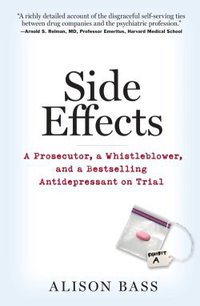 | |
| Author | Alison Bass |
|---|---|
| Language | English |
| Series | 1 |
| Subject | |
| Genre | Non-fiction |
| Publisher | Algonquin Books of Chapel Hill |
Publication date | June 17, 2008 |
| Media type | Hardcover |
| Pages | 260 |
| ISBN | 978-1-565-12553-7 |
| LC Class | KF228.S685B37 2008 |
Side Effects: A Prosecutor, a Whistleblower, and a Bestselling Antidepressant on Trial is a nonfiction book by investigative journalist Alison Bass that chronicles the lawsuit filed in 2004 against GlaxoSmithKline by then New York Attorney General Eliot Spitzer. [1]
Contents
Also examined is how Donna Howard, a former assistant administrator for Brown University’s department of Psychiatry, exposed deception in the research and marketing of Paxil, an antidepressant prescribed to millions of children and adults. [2] The book shows the connections between pharmaceutical giant GlaxoSmithKline (the maker of Paxil), a top Ivy League research institution, and the government agency designed to protect the public – conflicted relationships that may have compromised the health and safety of vulnerable children.
Side Effects also explores the controversy over drugs used to treat clinical depression, with a special focus on Paxil, Prozac and Zoloft. The book provides evidence of medical researchers "skewing results on behalf of pharmaceutical companies" that pay for the studies; pharmaceutical companies "marketing medicines without adequately disclosing adverse impacts;" and government agencies "unable or unwilling to adequately protect consumers," who sometimes die as a result. [3] [4]